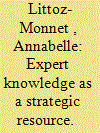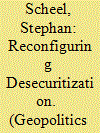| Srl | Item |
| 1 |
ID:
157355


|
|
|
|
|
| Summary/Abstract |
This article asks how international secretariats can sometimes expand their authority in areas that relate neither to their mandate, nor to their sphere of expert authority. Existing explanations of mission creep assume that IOs act autonomously and expand in those areas that connect with their mandates, sense of organizational mission, and sphere of expert authority. The claim here is that entrepreneurial bureaucrats can succeed—in the absence of policy deadlock among states—in creating creep in unexpected issue domains through the mobilization of external expertise. The article examines this dynamic in the domain of bioethical standards. It shows that UNESCO acted as a first mover in the field, despite having no relevant expertise, and despite bioethics being more closely connected to the mandate of other organizations. Entrepreneurial bureaucrats within UNESCO were able to create creep in bioethics by mobilizing external experts in the field and capturing their skills. Working with external experts endowed their organization with the capacity to act, gave epistemic authority to their actions, and prevented the politicization of debates in a potentially controversial issue domain. In pointing to the strategic uses of expertise, the article challenges the commonly held view that expert knowledge acts as a means of solving problems and rationalizing global governance.
|
|
|
|
|
|
|
|
|
|
|
|
|
|
|
|
| 2 |
ID:
188514


|
|
|
|
|
| Summary/Abstract |
This article introduces desecuritization as the missing supplement of the conception of securitization as a dispersed social process. It calls for the creative development of approaches that destabilise the credibility of security professionals’ claimed expert knowledge. To illustrate the potential of this approach, the article combines insights from the sociology of ignorance (agnotology) and the autonomy of migration literature to deconstruct the framing of migrants as cunning tricksters, a narrative that features prominently in processes of securitization. Within the Schengen visa regime discussed in this article, the trickster narrative emerges in the portrayal of visa applicants as deploying various modes of deception like ‘document fraud’ or ‘visa shopping’. Based on ethnographic fieldwork at consulates in North Africa, this article demonstrates, in contrast, that practices like applying at a consulate known for a more liberal decision-making practice constitute coping strategies by which migrants try to mitigate the uncertainty that a culture of suspicion, the discretionary power of consular staff and the heterogeneity of opaque decision-making criteria create for them. Ultimately, the analysis shows that security practices produce not only knowledge, but also various forms of nonknowledge which provoke the instances of ‘trickery’ that ever more pervasive security practices are supposed to forestall.
|
|
|
|
|
|
|
|
|
|
|
|
|
|
|
|